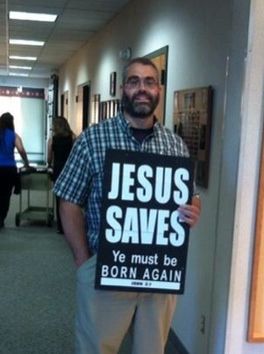Persuasion
A Blessing in Disguise for Atheists?
Supreme Court ruling may lead to more atheist visibility
Posted July 18, 2014

Atheist invocation: Let us NOT pray. . .
When the U.S. Supreme Court upheld sectarian legislative prayers in May, atheists and humanists criticized the ruling as yet another indication that the wall of separation between church and state is deteriorating. Thanks to the 5-4 decision in Town of Greece v. Galloway, many local boards across the country are certain to adopt practices that allow a steady stream of Christian prayer at public meetings. This, in turn, will validate the false idea that America is a “Christian nation.” It’s little wonder that many seculars were disappointed.
But although those fears are justified, some unintended consequences may flow from the Greece decision. In fact, the case may prove to be a valuable tool for the secular movement, enabling atheists and humanists to secure more visibility in their communities. The court gave a green light for sectarian prayer, but its ruling also opened the door for the participation of religious minorities, including atheists and humanists, in ceremonial government invocations. Suddenly, nonbelievers across America have more opportunity than ever for visibility in their local communities.
As Justice Kennedy wrote, the court found the prayer policy in the town of Greece acceptable because it “maintained that a minister or layperson of any persuasion, including an atheist, could give the invocation.” The purpose of invocations is to solemnize and lend gravity to meetings, the court said, and the Greece policy was acceptable because it allows the variety of religious (and nonreligious) voices from within a community to participate in that process. The ruling said invocation-givers may use sectarian prayer (a point that troubles seculars), but the overall invocation policy in any community must be not be divisive and must avoid conveying a sense of proselytizing or government favoritism of one religious group over another.
On Tuesday night, Dan Courtney made sure the town of Greece – a small suburb of Rochester, New York – kept its word on its policy of inclusion. A local secular activist, Courtney contacted the town to get on the invocation list immediately after the Supreme Court ruling came down. This week it was finally his turn, and the town board’s meeting room – usually nearly empty for routine business – was packed with onlookers, activists, and TV cameras.

Not happy with atheist invocations
There was some tension in the room – the board chair avoided the word "invocation" and instead introduced Courtney as the individual who would be delivering a “prayer,” while a few dirty looks were shot from board members at those who didn’t participate in the Pledge of Allegiance exercise (suggesting the exercise is perhaps not really voluntary). Meanwhile, a protester with a Jesus sign loomed in the hallway. But despite these distractions, Courtney delivered a powerful message of inclusion, referencing the framers and pointing out that the challenges of public policy must be solved through the participation and resources of all citizens. The invocation can be seen here, and I’d recommend it as a reference for anyone considering doing one.
Which brings me to an important point. Atheists and humanists are often complaining that they have few opportunities to gain visibility and acceptance at the local level, but the Greece decision provides a marvelous tool for remedying that problem. If your community has invocations for public meetings, you now have very strong grounds for demanding inclusion. In fact, any religious minority confronting resistance to efforts for inclusion can contact us at the American Humanist Association’s Appignani Humanist Legal Center to discuss it.
Shortly after the Greece decision came down, the AHA launched a secular invocation program. At the web site, atheists and humanists can find many resources to support them if they wish to deliver secular invocations in their municipalities. Clearly, this is an opportunity to make lemonade out of the lemon that was the Greece decision. If atheists and humanists have been overlooked and invisible for too long at the community level (particularly in the political arena), Greece provides a means of reminding government officials and other community leaders that the secular demographic deserves a place at the table.
The one thing that is needed, however, is a willingness of secular groups and individuals to assert themselves as invocation givers. No more complaining – it’s time to act.


